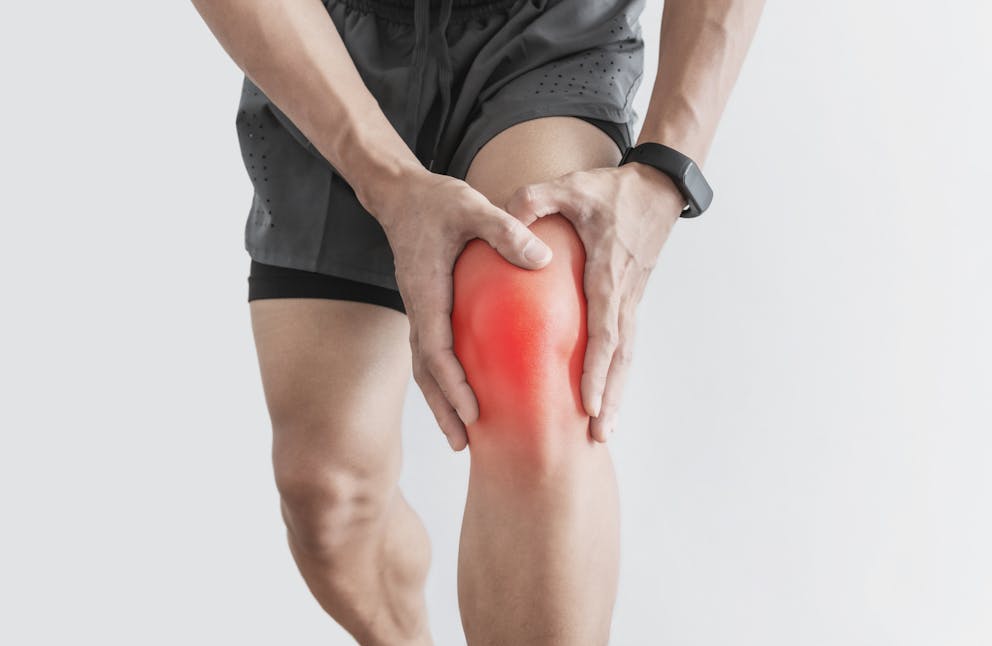The Ultimate Joint Healer Growth Hormone
Growth hormone plays a crucial role in our bodies, far beyond just helping us grow taller. As we age, this powerful hormone takes on new importance, especially for our joints.
Many people with joint pain don't realize that growth hormone is nature's own joint healer, working behind the scenes to repair and rejuvenate the connective tissues that keep us moving smoothly.
If you're dealing with creaky knees, stiff shoulders, or any kind of joint discomfort, understanding how growth hormone can help your joints could be life-changing.
Increased growth hormone levels mean your body will have the tools it needs to heal itself from the inside out. This could mean less pain and more mobility for you.
Let's explore the world of growth hormone and explore how it can transform your joint health. You'll learn natural ways to boost your levels and potentially avoid the need for synthetic injections or risky treatments.
Whether you're an athlete looking to stay in top form or simply want to age gracefully without joint issues slowing you down, this information is for you.
What Is Growth Hormone and How Does It Affect Joints?
Growth hormone, often abbreviated as GH, is a protein produced by the pituitary gland. While it's famous for its role in childhood growth, it continues to play a vital part in adult health, particularly in tissue repair and regeneration.
Growth hormone levels naturally decline with age. One of the effects of this is that our bodies become less efficient at repairing tissue damage, which can lead to joint pain.
When it comes to your joints, growth hormone is a key player in maintaining and healing cartilage, tendons, and ligaments.
It stimulates the production of insulin-like growth factor 1 (IGF-1) in the liver, which in turn promotes cell growth and division in various tissues, including those in our joints. Maintaining healthy IGF-1 levels can help you to retain muscle mass as you age.
The Joint-Healing Powers of Growth Hormone
Growth hormone benefits your joints in several ways:
It increases the synthesis of collagen, a crucial component of cartilage and connective tissue.
It stimulates the proliferation of chondrocytes, the cells responsible for producing and maintaining cartilage.
It enhances the repair of damaged tissue, helping to heal injuries and reduce inflammation.
It improves bone density, which is essential for overall joint health and stability.
These effects combine to create a powerful healing environment for joints that may be worn down by age, injury, or overuse.
The Science Behind Growth Hormone for Joints
Research has shown promising results for the use of growth hormone in joint health. A study published in the Journal of Orthopaedic Research found that growth hormone can stimulate cartilage growth and repair in animal models.
This suggests potential applications for treating conditions like osteoarthritis in humans. Scientists are also researching whether growth hormone injections could provide pain relief for people who have osteoarthritis.
Another interesting aspect is how growth hormone interacts with other bodily systems to promote joint health. It works synergistically with vitamin D and calcium to strengthen bones, which in turn supports joint function.
It also helps maintain muscle mass, which is crucial for joint stability and overall mobility.
Growth Hormone and Inflammation
One of the key benefits of growth hormone for joints is its anti-inflammatory effect. Arthritis pain, in particular, is often caused by inflammation. Growth hormone can help reduce inflammation and potentially slow the progression of joint diseases.
This anti-inflammatory action is particularly important as we age. Our natural growth hormone levels decline over time, which may contribute to the increased joint problems many people experience in their later years.

Natural Ways to Boost Growth Hormone for Joint Health
While synthetic growth hormone injections are available, they come with risks and are typically only prescribed for specific medical conditions such as growth hormone deficiency.
Fortunately, there are several natural ways to boost your body's own growth hormone production, which can benefit your joints and overall health.
1. Optimize Your Sleep
Sleep is when your body produces the most growth hormone. Aim for 7-9 hours of quality sleep each night. Create a consistent sleep schedule and a relaxing bedtime routine to maximize your growth hormone production.
2. High-Intensity Exercise
Short bursts of intense exercise can significantly increase growth hormone levels. Exercise capacity tends to decrease as we age, so it's important to maintain a regular exercise program. Try incorporating high-intensity interval training (HIIT) or weightlifting into your routine.
Even a few minutes of high-intensity exercise can make a difference. Weight training can help to build stronger muscles and bones, while HIIT can help to improve your cardiovascular health and burn calories.
3. Balanced Protein Intake
Moderate protein consumption is important for growth hormone production. Instead of consuming most of your protein in one meal, try to spread it evenly throughout the day to optimize protein synthesis.
Include lean meats, fish, eggs, and plant-based proteins in your diet. Aim for about 0.8-1 gram of protein per kilogram of body weight daily.
4. Intermittent Fasting
Fasting has been shown to increase growth hormone levels significantly. Consider trying intermittent fasting methods like the 16/8 approach, where you fast for 16 hours and eat within an 8-hour window.
This can be a great way to lose weight or maintain a healthy weight, which can reduce the stress on your joints. Some studies suggest that intermittent fasting could help to slow the aging process.
5. Reduce Sugar Intake
High insulin levels can suppress growth hormone production. Cutting back on sugar and refined carbs can help keep insulin levels in check and support healthy growth hormone levels.
Reducing sugar intake will also help you to avoid blood sugar spikes. It can also reduce your risk of developing high cholesterol, heart disease, and type 2 diabetes.
6. Consider Supplements
Certain supplements may help boost growth hormone levels naturally. These include:
GABA (Gamma-Aminobutyric Acid)
Arginine
Glutamine
Melatonin
Always consult with a healthcare professional before starting any new supplement regimen, especially if you have existing health conditions or are taking medications.
The Role of Colostrum in Joint Health
Colostrum, often called "liquid gold," is a nutrient-rich fluid produced by mammals in the first few days after giving birth. It's packed with growth factors and immune-boosting components that can benefit joint health.
For those looking to support their joints naturally, colostrum supplements can be beneficial. Here's why:
It contains insulin-like growth factors (IGFs) that mimic the effects of growth hormone.
It provides immune factors that can help reduce joint inflammation.
It contains compounds that support the repair and regeneration of tissues, including cartilage.
While not a direct source of growth hormone, colostrum can complement your body's natural production and support overall joint health.
Lifestyle Factors That Impact Growth Hormone and Joint Health
Your daily habits can significantly impact your growth hormone levels and, by extension, your joint health. Here are some key lifestyle factors to consider:
Stress Management
Chronic stress can suppress growth hormone production. Incorporate stress-reduction techniques like meditation, yoga, or deep breathing exercises into your daily routine.
Hydration
Staying well-hydrated is crucial for joint health and can support growth hormone production. Staying hydrated helps your body to flush out toxins, which can reduce inflammation. Aim for at least 8 glasses of water a day, more if you're active or in a hot climate.
Avoid Excessive Alcohol
Alcohol can interfere with growth hormone production and contribute to inflammation. If you drink, do so in moderation.
Maintain a Healthy Weight
Excess body fat, especially around the midsection, can lower growth hormone levels. Maintaining a healthy weight through diet and exercise can help optimize your hormone balance.
It can also help you to avoid putting excess stress on your joints, which is particularly important for weight-bearing joints, such as the hips and knees.
Maintaining a healthy weight may also help to reduce your risk of developing certain diseases such as high blood pressure and kidney disease.
When to Consider Professional Help
While natural methods can be effective for many people, there are times when it's important to seek professional medical advice regarding growth hormone for joints. Consider consulting a healthcare provider if:
You're experiencing persistent or severe joint pain
You have a diagnosed condition like osteoarthritis or rheumatoid arthritis
Natural methods aren't providing sufficient relief
You're considering growth hormone therapy or injections
A healthcare professional can provide personalized advice and may recommend tests to check your hormone levels and overall joint health. They may also recommend growth hormone treatment if other approaches haven't been effective.

The Future of Growth Hormone Therapy for Joints
Research into growth hormone for joints continues to evolve. Scientists are exploring new delivery methods and targeted therapies that could provide the benefits of growth hormone without the risks associated with systemic treatment.
Scientists are studying whether intra-articular growth hormone could be a safe and effective way to treat joint pain. This involves injecting growth hormone directly into the affected joint.
One promising area is the use of growth hormone in combination with other regenerative therapies, such as platelet-rich plasma (PRP) or stem cell treatments. These combined approaches could offer more comprehensive joint healing and repair.
As our understanding of growth hormone and joint health deepens, we may see more tailored treatments that can address specific joint issues with greater precision and fewer side effects.
For example, there's currently no cure for osteoarthritis, but scientists are hopeful that growth hormone therapy could be used to slow its progression in the future.
Thyroid Boost
This comprehensive guide emphasizes the importance of optimizing thyroid health through balanced nutrition, stress management, and regular exercise. Incorporating nutrient-rich foods like salmon bowl into your diet can play a significant role in achieving these goals.
Salmon, known for its omega-3 fatty acids and selenium content, promotes thyroid health and metabolic function.
Enjoying a delicious salmon bowl, packed with vegetables and healthy fats, not only satisfies cravings but also provides essential nutrients to support your thyroid and overall well-being.
By following expert weight loss tips and incorporating savory salmon bowls into your meals, you can effectively boost your thyroid function and achieve sustainable weight loss.
Conclusion
Growth hormone for joints offers a promising avenue for maintaining and improving joint health as we age. By understanding how this powerful hormone works and taking steps to optimize our natural production, we can support our joints from the inside out.
Whether through lifestyle changes, targeted supplements like colostrum, or under the guidance of a healthcare professional, harnessing the power of growth hormone could be key to keeping our joints healthy and pain-free for years to come.
Remember, while growth hormone plays a crucial role, it's just one piece of the puzzle. A holistic approach that includes a balanced diet, regular exercise, and stress management will give you the best chance at maintaining strong, flexible joints throughout your life.
Listen to your body, stay informed, and don't hesitate to seek professional advice when needed. Your joints will thank you for the attention and care.
Previous blog
Low-Fat Diets Preventing Gallstones is a MythNext blog
What Are the Adrenal GlandsTags

Popular
08/21/2024
55.7K views
02/23/2025
46.8K views
11/18/2024
281.1K views
03/18/2024
11/21/2022




